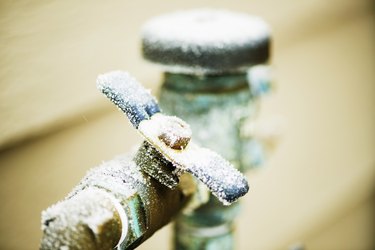Protecting Against Frozen Plumbing: Top Methods for Cold Weather
Protecting Against Frozen Plumbing: Top Methods for Cold Weather
Blog Article
They are making several great annotation on the subject of 6 Ways to Prevent Frozen Pipes overall in the article followed below.

Winter can damage your pipes, specifically by freezing pipes. Right here's how to stop it from happening and what to do if it does.
Introduction
As temperatures decrease, the risk of frozen pipes boosts, possibly resulting in pricey repairs and water damage. Recognizing how to stop frozen pipes is important for house owners in chilly environments.
Understanding Icy Pipelines
What causes pipelines to freeze?
Pipelines ice up when revealed to temperature levels listed below 32 ° F (0 ° C) for prolonged periods. As water inside the pipes ices up, it expands, taxing the pipeline wall surfaces and possibly causing them to rupture.
Threats and damages
Frozen pipes can cause supply of water disruptions, residential property damage, and costly repair services. Ruptured pipes can flooding homes and create extensive architectural damages.
Signs of Frozen Pipeline
Identifying frozen pipelines early can stop them from breaking.
Just how to identify frozen pipes
Look for lowered water flow from taps, unusual odors or sounds from pipes, and noticeable frost on revealed pipes.
Avoidance Tips
Insulating susceptible pipelines
Wrap pipes in insulation sleeves or utilize warmth tape to safeguard them from freezing temperature levels. Focus on pipes in unheated or exterior locations of the home.
Home heating strategies
Keep interior areas sufficiently heated, particularly locations with plumbing. Open cupboard doors to permit warm air to flow around pipes under sinks.
Safeguarding Exterior Plumbing
Yard hose pipes and outside faucets
Detach and drain yard hoses prior to winter months. Mount frost-proof spigots or cover outdoor faucets with shielded caps.
What to Do If Your Pipelines Freeze
Immediate activities to take
If you presume frozen pipelines, keep faucets open to soothe pressure as the ice melts. Make use of a hairdryer or towels soaked in warm water to thaw pipes slowly.
Long-Term Solutions
Structural changes
Consider rerouting pipelines away from exterior walls or unheated areas. Include added insulation to attic rooms, cellars, and crawl spaces.
Updating insulation
Invest in high-quality insulation for pipelines, attics, and walls. Correct insulation helps keep constant temperatures and minimizes the threat of frozen pipes.
Final thought
Protecting against frozen pipelines needs aggressive actions and fast reactions. By understanding the reasons, indicators, and preventive measures, property owners can protect their plumbing during winter.
Helpful Tips to Prevent Frozen Pipes this Winter
UNDERSTANDING THE BASICS: WHY PIPES FREEZE AND WHY IT’S A PROBLEM
Water freezing inside pipes is common during the winter months, but understanding why pipes freeze, and the potential problems it can cause is crucial in preventing such incidents. This section will delve into the basics of why pipes freeze and the associated problems that may arise.
THE SCIENCE BEHIND FROZEN PIPES
When water reaches freezing temperatures, it undergoes a physical transformation and solidifies into ice. This expansion of water as it freezes is the primary reason pipes can burst. As the water inside the pipe freezes, it expands, creating immense pressure on the walls. If the pressure becomes too great, the pipe can crack or rupture, leading to leaks and water damage.
FACTORS THAT CONTRIBUTE TO PIPE FREEZING
Low Temperatures: Extremely cold weather, especially below freezing, increases the risk of pipes freezing. Uninsulated or Poorly Insulated Pipes: Pipes located in unheated areas, such as basements, crawl spaces, or attics, are more prone to freezing. Insufficient insulation or lack of insulation altogether exacerbates the problem. Exterior Wall Exposure: Pipes running along exterior walls are susceptible to freezing as they encounter colder temperatures outside. Lack of Heating or Temperature Regulation: Inadequate heating or inconsistent temperature control in your home can contribute to frozen pipes. PROBLEMS CAUSED BY FROZEN PIPES
- Pipe Bursting: As mentioned earlier, the expansion of water as it freezes can cause pipes to burst, resulting in significant water damage.
- Water Damage: When pipes burst, it can lead to flooding and water damage to your property, including walls, ceilings, flooring, and personal belongings.
- Structural Damage: Prolonged exposure to water from burst pipes can compromise the structural integrity of your home, leading to costly repairs.
- Mold and Mildew Growth: Excess moisture from water damage can create a favorable environment for mold and mildew growth, posing health risks to occupants.
- Disrupted Water Supply: Frozen pipes can also result in a complete or partial loss of water supply until the issue is resolved.
WHY CERTAIN PIPES ARE MORE PRONE TO FREEZING
- Location: Pipes located in unheated or poorly insulated areas, such as basements, crawl spaces, attics, or exterior walls, are at higher risk of freezing.
- Exterior Pipes: Outdoor pipes, such as those used for irrigation or exposed plumbing, are particularly vulnerable to freezing as they are directly exposed to the elements.
- Supply Lines: Pipes that carry water from the main water supply into your home, including the main water line, are critical to protect as freezing in these lines can affect your entire plumbing system.
- Underground Pipes: Pipes buried underground, such as those connected to sprinkler systems or outdoor faucets, can be susceptible to freezing if not properly insulated.
https://busybusy.com/blog/helpful-tips-to-prevent-frozen-pipes-this-winter/

We are very inquisitive about Winter Plumbing Precautions: Preventing Frozen Pipes and I really hope you enjoyed our article. Don't hesitate to take the time to promote this post if you liked it. We take joy in reading our article about Helpful Tips to Prevent Frozen Pipes this Winter.
Book A Service Call Report this page